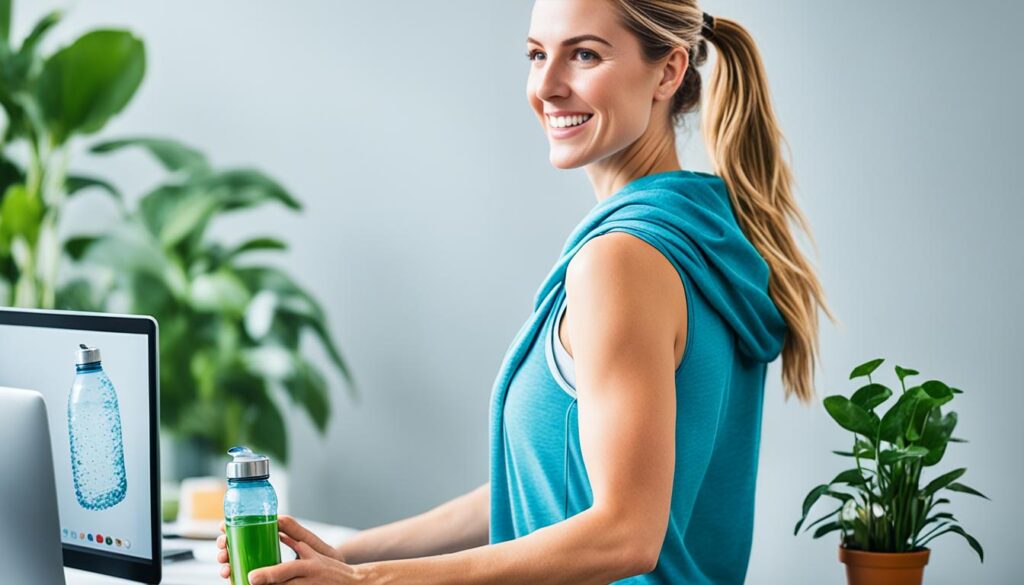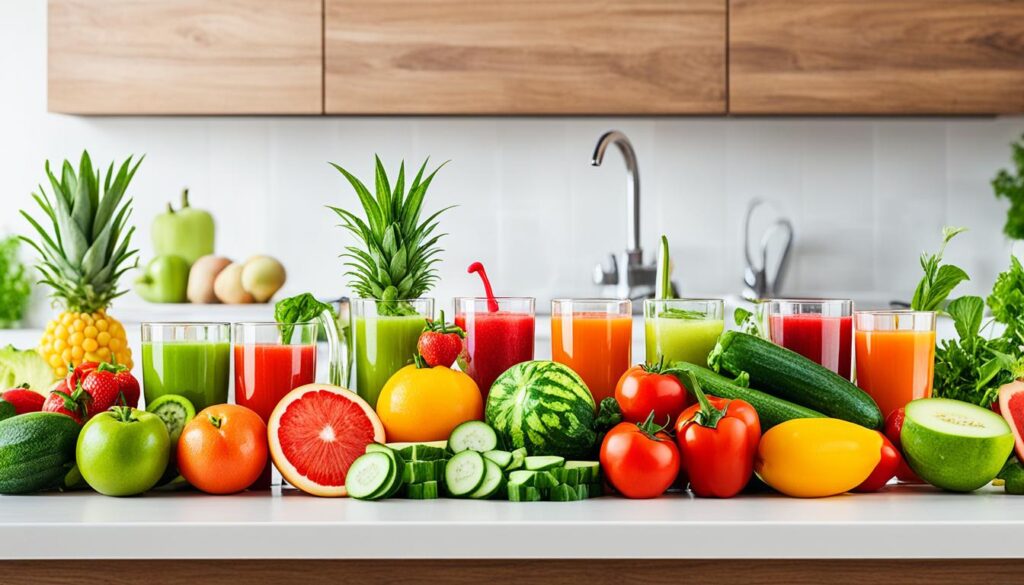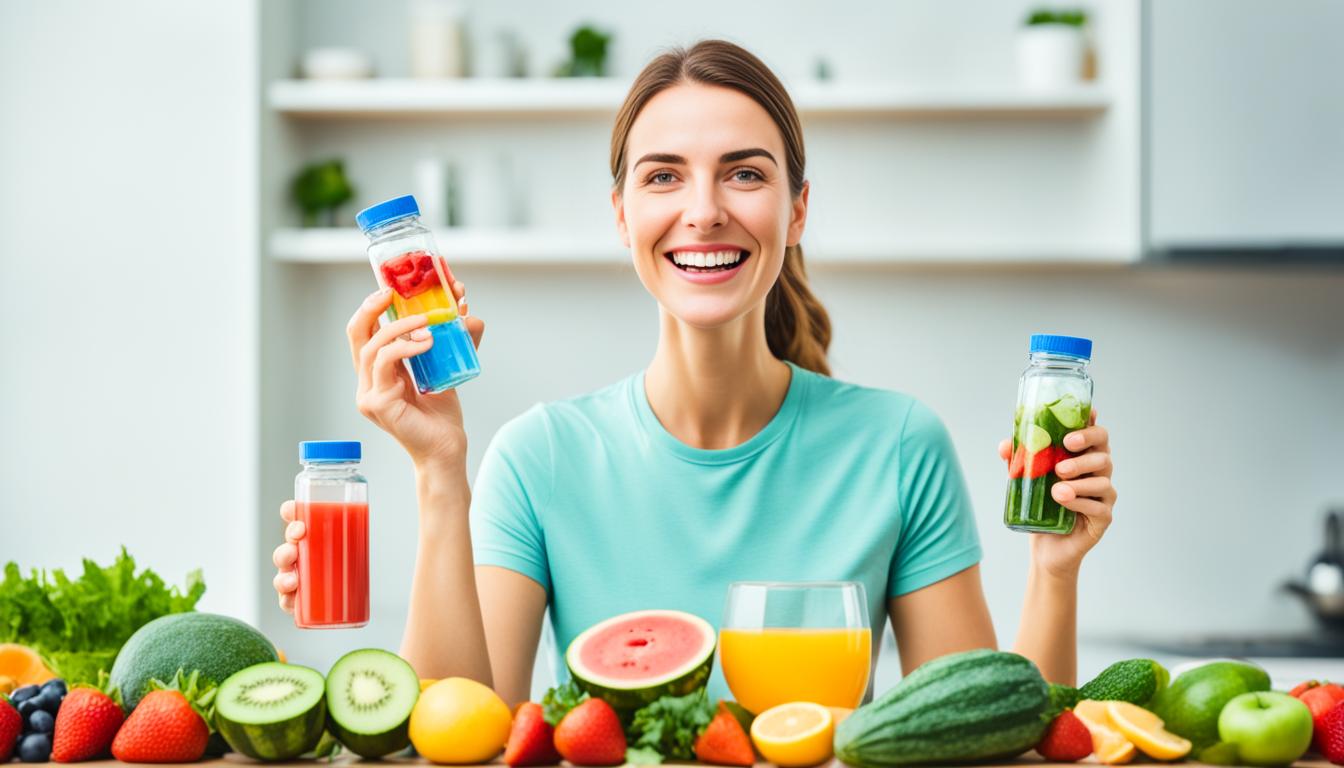Water is crucial for our bodies to work well, from digesting food to controlling our temperature. It’s important to replace the water we lose through breathing and sweat. Drinking plenty of water and forming good habits around it helps you stay hydrated. Men should try to drink about 124 ounces of water per day, and women should aim for 92 ounces according to the Mayo Clinic1.
Drinking enough water supports our body’s processes, like getting rid of toxins and keeping our joints moving smoothly. It’s recommended to drink plenty of water to avoid dehydration and keep our bodies working their best.
Around 20% of the water we need every day comes from the food we eat, while drinks provide the other 80%1. Some people, like babies, people who work outside, and the elderly, are at a higher risk of dehydration for many reasons1.
Staying hydrated is great for our skin and keeps us from getting dehydrated. Make drinking water a regular part of your day to stay well-hydrated. This is essential for our health and well-being.
Importance of Staying Hydrated
Keeping your body hydrated is crucial for good health. The body is mostly water, about 70%2. Drinking enough water daily helps many of your body’s functions, such as making your kidneys work better and keeping your skin healthy.
Health Benefits of Proper Hydration
Staying well-hydrated has many health upsides. It’s good for your digestion, keeps your body at the right temperature, and stops your joints from getting too stiff. Not drinking enough water can lead to dehydration, a major risk for babies, kids, people who work outside, and the elderly1.
Recommended Daily Water Intake
How much water you need each day depends on if you’re a man or a woman. Women should drink about 92 ounces, and men about 124 ounces. This includes not just water but any fluids you drink, and even food1. Following these targets helps you to stay healthy.
Signs of Dehydration
Knowing when you’re getting dehydrated is important. If you feel tired, dizzy, or always want to drink, you might not be drinking enough. One way to check is to look at your urine; it should be nearly clear or pale yellow1. Ways to drink more water include having a glass as soon as you get up and another before you eat. These habits keep you from getting dehydrated.
Easy Ways to Increase Your Water Intake Throughout the Day
It can be hard to drink enough water every day. However, there are easy steps you can take. These steps will help you stay hydrated.
Setting Daily Water Goals
Setting daily water goals is a smart move. For example, aim to drink eight glasses daily. To help you keep track, use apps or devices that remind you to drink. This way, you can see if you’ve hit your goals3. Women should try to drink 92 ounces every day, while men should aim for 124 ounces1.
Keeping a Reusable Water Bottle Handy
Have a water bottle with you all the time. It reminds you to sip throughout the day. Plus, it’s good for the planet. New water bottles have cool features like time markers and fruit infusers1. These help make drinking water more fun3.
https://www.youtube.com/watch?v=DrH-J-pWyfQ
Flavoring Your Water
Make water tastier by adding natural flavors. Lemon, cucumber, or berries work great. They add taste without extra sugar12. This makes drinking water more interesting and easier to stick with.
Alternate Drinks with Water
Swap sugary drinks for water. It boosts your water intake and cuts down on extra sugar and calories2. This is good for managing your weight and overall health. Plus, mixing up your drinks keeps hydration exciting3.
Healthy Hydration Habits for Busy Lifestyles
Staying well-hydrated with a hectic routine is doable. You just need to plan out your water intake. Make it a part of your daily schedule to drink water often. This will keep you feeling good.
Try to drink water every time you eat or go to the bathroom. It helps you get enough water without a lot of extra work.
Incorporating Water into Your Routine
Start with easy goals for drinking water, like one glass before meals. This motivates you to drink more over time. Add watery fruits like watermelon to your snacks to stay hydrated.
This approach is great for staying hydrated during busy days. It makes drinking water a part of your daily life without extra effort.
Using Technology to Track Water Intake
Keeping track of your water intake with apps and smart bottles is helpful. They remind you to drink and show how much you’ve had. Aim to drink 125 ounces a day if you’re a man, 92 if you’re a woman1.
These tools make watching your water intake easier. They help fit water-drinking into your busy life. Plus, you can adjust your goals to what works best for you.

Tips for Drinking More Water on the Go
Always carry a water bottle with you if you’re often out and about. Seeing it can remind you to sip throughout the day. It’s a good way to avoid sugary drinks, which can lead to health problems like obesity and heart disease2.
Making these simple choices encourages you to drink more water, no matter how busy you are. It’s all about forming good habits.
Increasing Water Intake Through Food
Getting more water into your diet is easier than you might think. Eating foods that are full of water can help. Since our bodies are mainly water, it’s vital to keep hydrated for good health2. Foods such as melons, cucumbers, and leafy greens are a great choice. They are natural and nutritious. Lettuce is 96% water, celery 95%, and watermelon 91%. This shows how you can eat your water too2.

These foods also give you important vitamins, minerals, and antioxidants. They support your general health. Setting specific water intake goals along with eating these foods can boost your hydration2. A cool tip is to drink a glass of water before meals. This can help you take in less calories and adds 3 cups (720 ml) of water to your day read more here2.
Drinking water and munching on water-rich foods all day keeps you hydrated. It’s a simple way to make sure you drink enough water. Try adding these foods to your meals and snacks. This way, you not only keep hydrated but also nourish your body well.
The Role of Electrolytes in Hydration
Electrolytes are key in keeping us hydrated and our cells working as they should. They balance the fluids in our body. They also help control pH levels. Plus, they keep our nerves and muscles in check, important for being hydrated in any situation.
Understanding Electrolytes
Sodium, potassium, magnesium, and calcium are crucial for our body’s electrolyte balance and moisture levels. They help move nutrients into our cells and get rid of waste. They make sure our nervous system and muscles work well4. If they are out of balance, symptoms like being tired, confused, or having an irregular heartbeat4 might appear. This shows how vital it is to manage your electrolytes well.
Foods High in Electrolytes
Eating foods rich in electrolytes can keep the balance and help in hydration. Dairy, leafy greens, bananas, and avocados are full of these essential minerals. Adding sea salt, especially Himalayan Pink Salt, to water boosts its potassium and magnesium content5. Watermelon, lemons, and oranges are great too. They naturally increase the electrolyte levels in water5.
Hydration Drinks with Electrolytes
After exercise or when you’re sick, hydration drinks with electrolytes are best. Nuun Endurance and Liquid I.V. are good choices because they work well and are easy to use4. Gatorade, though high in sugar, is good for fast electrolyte replenishment4. You can also use electrolyte powders or drops to make your own special hydration solution. For example, Mini Dew™ is liked by many for its quality5.
Adding these to what you eat can help keep you hydrated, balance electrolytes, and boost your health. This is especially true in hot weather or when physically active.
Common Myths and Misconceptions about Hydration
Many people believe myths that lead to wrong ideas about drinking water. A big myth is the idea that we all need to drink eight 8-ounce glasses daily. But, in 2002, a big study showed this wasn’t exactly true. It said the amount of water each person needs can vary a lot. In a place with a normal climate, the daily water amount for adults might be 92-124 ounces6.
Another myth is that only water really helps with hydration. But, the truth is about 20% of the fluids we need come from food. And drinks like coffee also count, even if coffee makes you go to the bathroom a bit more. This means caffeinated drinks work as well as water to keep us hydrated67. As for sports drinks, you usually don’t need them unless you’re working out hard or it’s very hot. In those cases, they can help keep your body’s electrolytes balanced6.
Lots of folks think if they’re thirsty, it means they need more water. But waiting till you’re thirsty isn’t the best idea. By then, your body might be starting to get dehydrated. It’s smarter to drink water often during the day, even when you don’t feel thirsty6. This is especially true for older adults, who might not feel thirsty as quickly7.
Some are worried they might drink too much water. This can be a concern, as drinking too much can mess with your electrolytes. It might even make you feel sick or confused. But, this happens very rarely, usually when someone drinks way more than what’s normal6. Getting past these myths can help us all drink the right amount of water. We can then stay healthy and hydrated without worrying about these misleading ideas.
Taking Action: Building Hydration into Your Daily Life
It’s vital to make hydration a part of your everyday routine for good health. Begin by always having a refillable water bottle with you.
This will prompt you to drink more water each day. It also helps the environment by cutting down on plastic waste.
Choosing water over sugary drinks is a smart move. Keeping added sugars below 5% of your daily calories can prevent serious health issues like obesity and heart disease2.
Drinking water before meals can increase your daily water intake by 3 cups (720 ml). It also aids digestion and helps control your appetite2.
Eating fruits and veggies with high water content is also key. Things like melons, cucumbers, and leafy greens keep you hydrated. They also offer important vitamins and minerals, making up 20% of your daily fluid needs1.
By following these easy tips, you can make sure you’re drinking enough water every day. This is crucial for staying healthy and feeling good.
FAQ
What are the health benefits of proper hydration?
What is the recommended daily water intake for adults?
What are some signs of dehydration?
How can I set daily water goals?
Why is keeping a reusable water bottle handy important?
How can I make water more enjoyable to drink?
What are the benefits of alternating drinks with water?
How can busy individuals incorporate hydration into their routine?
What are some tips for drinking more water on the go?
How can I increase my water intake through food?
Why are electrolytes important for hydration?
What foods are high in electrolytes?
When should I consider hydration drinks with electrolytes?
What are some common myths about hydration?
How can I build hydration into my daily life?
Source Links
- https://www.mayoclinichealthsystem.org/hometown-health/speaking-of-health/tips-for-drinking-more-water
- https://www.healthline.com/nutrition/how-to-drink-more-water
- https://www.today.com/health/diet-fitness/how-to-drink-more-water-rcna32824
- https://www.cnet.com/health/nutrition/electrolyte-hacks-how-to-stay-hydrated-and-energized-all-day/
- https://moonjuice.com/blogs/tips-and-tricks/how-to-add-electrolytes-to-water
- https://www.urmc.rochester.edu/news/publications/health-matters/hydration-101-drinking-8-glasses-of-water-and-other-myths-debunked
- https://www.npr.org/2022/09/21/1124371309/busting-common-hydration-water-myths




